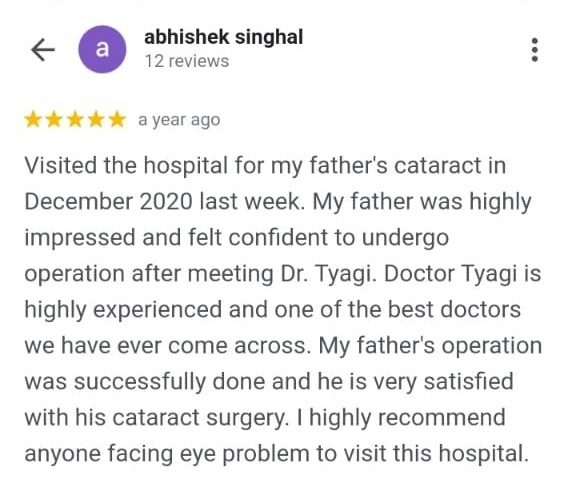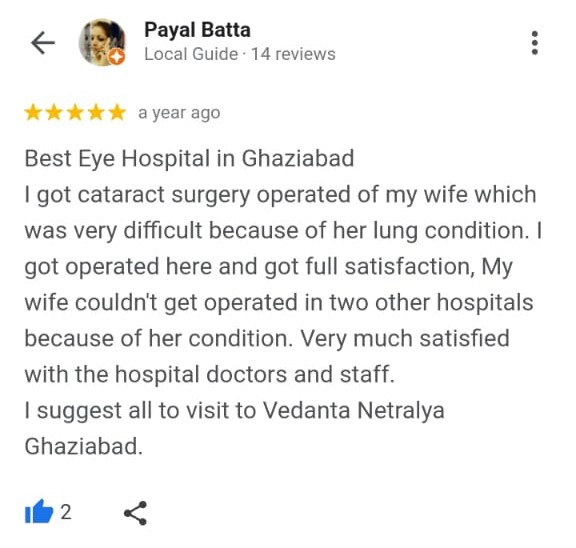
Information About Cataract Surgery and Lenses
Cataracts are one of the most common eye conditions, particularly among older adults. They can significantly impact vision and quality of life. The good news is that cataract surgery is a highly effective procedure with excellent outcomes. In this blog, we’ll explore everything you need to know about cataracts, their symptoms, treatment options, and why Vedanta Netralya is the best choice for cataract surgery in Ghaziabad and affordable cataract surgery in Noida.
What is a Cataract?
A cataract is the clouding of the eye’s natural lens, leading to blurred vision. It occurs when proteins in the lens break down and clump together, forming a cloudy area. Cataracts can develop in one or both eyes but do not spread from one eye to the other.
How Does a Cataract Develop?
Cataracts typically develop due to aging, but other causes include:
- Ultraviolet (UV) exposure
- Diabetes
- Smoking and alcohol consumption
- Eye injuries or trauma
- Prolonged use of steroid medications
- Genetic predisposition
Symptoms of Cataracts
- Blurry or cloudy vision
- Difficulty seeing at night
- Increased sensitivity to light and glare
- Seeing halos around lights
- Double vision in one eye
- Frequent changes in eyeglass or contact lens prescription
- No improvement in vision even after wearing glasses
If you experience these symptoms, you should visit your eye doctor for a complete eye examination. The doctor will assess which eye has a cataract, how severe it is, and whether it is operable or not.

- 🔹 The doctor will assess the grade of cataract and determine how much vision is affected.
- 🔹 Cataract cannot be reversed or treated with medications. It is an age-related condition that requires surgery if vision is significantly impaired.
- 🔹 Cataract surgery is necessary if vision is not improving with glasses.

When Should Cataract Surgery Be Done?
Cataract surgery should be considered when:
- Vision impairment interferes with daily activities such as reading, driving, recognizing faces, or kitchen work.
- There is no improvement with glasses, or the glasses prescription is increasing disproportionately.
- The eye surgeon assesses that the cataract has reached an operable stage.
Can I delay my cataract surgery?
- Cataract surgery is elective, not an emergency. However, delaying surgery can make the cataract harder, increasing complications and recovery time.
- If you are experiencing vision difficulties, it is best not to delay the surgery.
Surgical Procedures for Cataract Surgery
1. Phacoemulsification (Phaco Surgery)
- 🔹 The most common and safest procedure.
- 🔹 Uses ultrasound waves to break the cloudy lens.
- 🔹 A new intraocular lens (IOL) is implanted inside the eye.
- 🔹 Minimally invasive with fast recovery.
1. Femto-Assisted Phacoemulsification (Laser Cataract Surgery)
- 🔹 Uses laser technology to make incisions and soften the lens.
- 🔹 The rest of the procedure is similar to Phacoemulsification.
- 🔹 No additional visual benefit for most patients but is a marketing term for robotic surgery.
Which Procedure Should You Choose?
- 🔹 Phacoemulsification is highly effective and the gold standard for cataract treatment.
- 🔹 Femto-assisted surgery does not offer additional benefits in most cases but is costlier.
- 🔹 Investing in a high-quality lens is more beneficial than opting for laser-assisted surgery.
Which Intraocular Lens (IOL) Should You Choose?
There are different types of IOLs available:
- Monofocal Lenses – Provide clear vision at one distance (near or far).
- Multifocal Lenses – Help with both near and distance vision, reducing dependency on glasses.
- Toric Lenses – Correct astigmatism along with cataract removal.
- Extended Depth-of-Focus (EDOF) Lenses – Provide a broader range of vision.

Preoperative Investigations Before Cataract Surgery
Before surgery, you may need the following tests:
- Visual acuity test
- Corneal measurements (Keratometry, A-Scan Biometry)
- Retinal examination
- Blood sugar levels (if diabetic)
- General health checkup (if required)
Hospital Stay and Recovery Time for Cataract Surgery
- Cataract surgery is an outpatient procedure – no hospital stay required.
- Cataract surgery is an outpatient procedure – no hospital stay required.
- Recovery time: Most patients see improvements within 24-48 hours, with full recovery in 2-4 weeks.
Postoperative Care After Cataract Surgery
- 🔹 Use prescribed eye drops to prevent infection and inflammation.
- 🔹 Avoid rubbing or touching your eyes.
- 🔹 Protect your eyes from dust, water, and direct sunlight.
- 🔹 No dietary restrictions – eat a normal diet.
- 🔹 Follow up with your doctor as advised.
When Can You Resume Normal Activities?
- Work & Computer Use: 2-3 days
- Driving: After 1 week (if vision is stable)
- Reading/Watching TV: After 24-48 hours
- Heavy Exercise: After 2-3 weeks
- Kitchen Work & Household Tasks: 5-7 days
- Traveling: After 7-10 days
Does Insurance Cover Cataract Surgery?
- Yes, most health insurance policies cover cataract surgery partially or fully, including government schemes like Ayushman Bharat.
- Coverage depends on the hospital, lens choice, and policy terms – check with your insurance provider.
Cataract Operation Cost in Ghaziabad & Noida
- Phacoemulsification with Monofocal IOL: ₹15,000 - ₹30,000
- Phacoemulsification with Multifocal/Toric IOL: ₹40,000 - ₹80,000
- Femto-Assisted Cataract Surgery: ₹70,000 - ₹1,50,000
- Premium Lenses (EDOF, Trifocal, Toric Multifocal): ₹90,000 - ₹2,00,000
Why Choose Vedanta Netralya for Cataract Surgery?
- Highly Experienced Eye Surgeons with thousands of successful surgeries.
- Latest Technology & Equipment for precision.
- Personalized Treatment Plans to match your vision needs.
- Affordable & Transparent Pricing with insurance support.
- Exceptional Patient Care with fast recovery.
📞 Book an Appointment Now!
📍 Vedanta Netralya, Ghaziabad
📲 Call: [9873518513,9999337402]
🌐 Visit: [Website:www.vedantanetralyagzb.com
Frequently Asked Questions
Our comprehensive approach to patient care means that your care can be managed all under one roof. See what patients usually ask about their problems.
- Friend or family member (someone to help with paperwork, driving home, etc.)
- Medicare or insurance papers
- Current prescription glasses (even if not worn presently)
- Physician medical consent
- Any prescribed medicines & details of prescription including dosage and strength
- Sweater or jacket if required
- Lunch or snack
Most patients may leave within a few hours after the surgery.
What happens before I?m discharged?
- After the surgery, we will take you to post-op room to relax for some time.
- We will check your pulse and blood pressure
- We will check your eye pressure and explain your postoperative instructions and medications to you and a friend or family member.
- Afterward, an attending eye surgeon will examine your eye or we will make arrangements to check you the following day.
CATARACT SURGERY REVIEWS
Our Patients valuable reviews for us. See what they said about our Eye Hospital.



